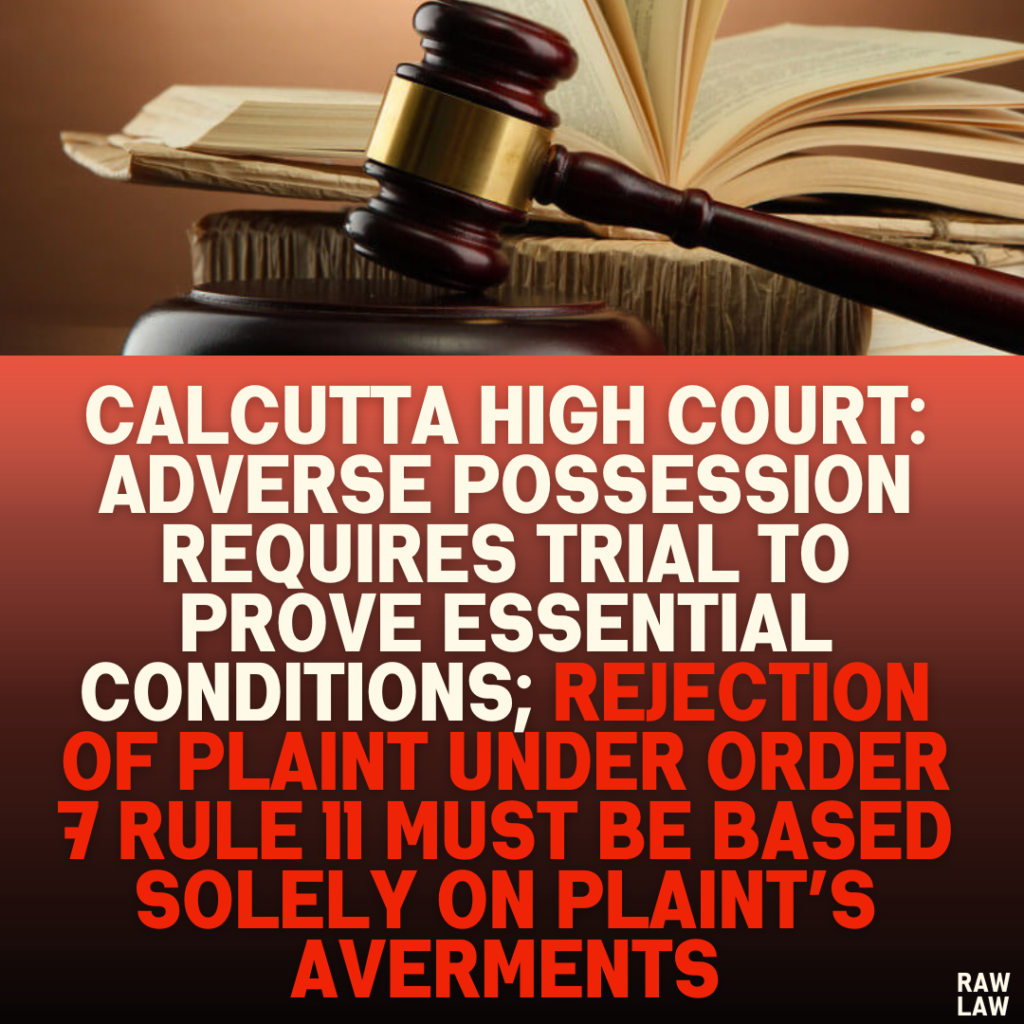Court’s Decision
The Calcutta High Court dismissed the defendant’s civil revision application challenging the trial court’s order that refused to dismiss the plaintiffs’ suit under Order 7 Rule 11 of the Code of Civil Procedure (CPC). The court held that the issues raised in the case, particularly the claim of adverse possession, involved mixed questions of law and fact that necessitated a trial. It concluded that the trial court had correctly decided not to reject the plaint at the preliminary stage.
Facts of the Case
- Background of Ownership:
- The suit property was originally owned by the defendants’ predecessor-in-interest, who never challenged the plaintiffs’ possession during his lifetime.
- The plaintiffs alleged continuous and uninterrupted possession of the property for over 12 years, asserting that they had developed the property, paid taxes, and maintained utility connections in their names.
- Plaintiffs’ Claim:
- The plaintiffs claimed ownership through adverse possession, arguing that their possession had been hostile to the defendants’ interest for the statutory period.
- They further asserted that their predecessor purchased the property in the name of the defendants’ predecessor, but the latter had no actual connection with the property.
- Defendants’ Argument:
- The defendants filed an application under Order 7 Rule 11, arguing that the suit was barred by law and failed to disclose a valid cause of action.
- They also claimed that the plaintiffs’ case was contradictory, as it simultaneously relied on ownership by purchase and adverse possession.
Issues Identified by the Court
The court identified three main issues to decide:
- Order 7 Rule 11 CPC:
- Whether the suit could be dismissed at the threshold based on the averments in the plaint.
- Benami Property Act:
- Whether Section 4 of the Prohibition of Benami Property Transactions Act, 1988, barred the plaintiffs’ claim.
- Adverse Possession:
- Whether the plaintiffs’ claim of adverse possession satisfied the necessary legal conditions.
Petitioner’s (Defendants’) Arguments
- Contradictory Claims:
- The defendants argued that the plaintiffs’ claim was inconsistent, as they simultaneously claimed ownership through purchase and adverse possession.
- Benami Act Applicability:
- They contended that the property was held benami and that Section 4 of the Benami Act barred any claim by the plaintiffs.
- Rejection of Plaint:
- They sought dismissal of the suit under Order 7 Rule 11, claiming it failed to disclose a cause of action and was barred by law.
Respondent’s (Plaintiffs’) Arguments
- Adverse Possession:
- The plaintiffs maintained that they had openly and continuously possessed the property for over 12 years without interference, fulfilling the requirements of adverse possession.
- Benami Act Inapplicable:
- They denied the applicability of the Benami Act, asserting that their claim was based solely on adverse possession and not on a benami transaction.
Analysis of the Law
1. Order 7 Rule 11 CPC
- The court emphasized that rejection of a plaint under Order 7 Rule 11 must be based solely on the plaint’s averments and accompanying documents, without considering the defendant’s pleadings or evidence.
- It noted that a plaint can only be rejected if it:
- Does not disclose a cause of action.
- Is barred by law.
- Contains insufficient details to sustain the claim.
- The court clarified that whether the plaintiffs’ claim of adverse possession was valid or not was a matter of trial and could not be determined at this preliminary stage.
2. Prohibition of Benami Transactions Act, 1988
- Section 4 of the Benami Act prohibits claims to property held in the name of another person (benami property) unless the transaction falls under certain exceptions.
- The court held that the plaintiffs’ claim of adverse possession did not involve a benami transaction, and Section 4 was therefore irrelevant to the case.
3. Adverse Possession
- The court highlighted the essential conditions for adverse possession, as outlined in Article 64 and 65 of the Limitation Act:
- Actual Possession: The plaintiffs must physically occupy the property as owners.
- Exclusive Control: The property must be under the sole control of the plaintiffs.
- Continuous Use: Possession must be uninterrupted for at least 12 years.
- Hostile Intent: The plaintiffs’ possession must be without the true owner’s permission.
- It observed that the plaintiffs had alleged these conditions in their plaint and provided supporting details, making their claim suitable for trial.
Precedent Analysis
The court referred to precedents, including:
- Karnataka Board of Wakf v. Government of India: Establishing the essential elements of adverse possession.
- T. Anjanappa v. Somalingappa: Emphasizing that possession must be open, exclusive, and hostile to the true owner’s interest.
These cases underscored that adverse possession claims involve mixed questions of law and fact, requiring evidence and cannot be decided summarily.
Court’s Reasoning
- The court found that the plaintiffs’ averments, if proven, could substantiate a claim for adverse possession.
- It determined that whether the plaintiffs’ possession was adverse involved factual disputes unsuitable for resolution under Order 7 Rule 11.
- The applicability of the Benami Act and the plaintiffs’ right to claim adverse possession could only be adjudicated after a trial.
Conclusion
The court dismissed the revision application, affirming the trial court’s decision to proceed with the suit. It vacated any interim relief and disposed of related applications.
Implications
This judgment reinforces that courts must exercise caution when rejecting plaints under Order 7 Rule 11 CPC. It underscores that claims involving complex factual and legal questions, such as adverse possession, should proceed to trial for comprehensive adjudication. The ruling also clarifies that the Benami Act does not automatically bar claims of adverse possession unless explicitly connected to a benami transaction.
